Unit 9 Learning Lesson 3 The Secrets of Your Memory课件(共30张,内嵌视频)2024-2025学年高一英语北师版(2019)必修第三册
文档属性
| 名称 | Unit 9 Learning Lesson 3 The Secrets of Your Memory课件(共30张,内嵌视频)2024-2025学年高一英语北师版(2019)必修第三册 |
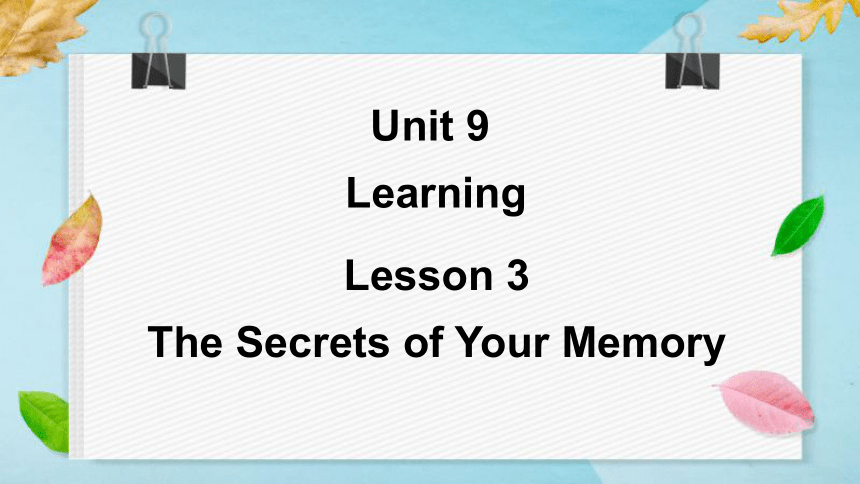
|
|
| 格式 | pptx | ||
| 文件大小 | 44.2MB | ||
| 资源类型 | 教案 | ||
| 版本资源 | 北师大版(2019) | ||
| 科目 | 英语 | ||
| 更新时间 | 2025-04-29 21:35:03 | ||
图片预览

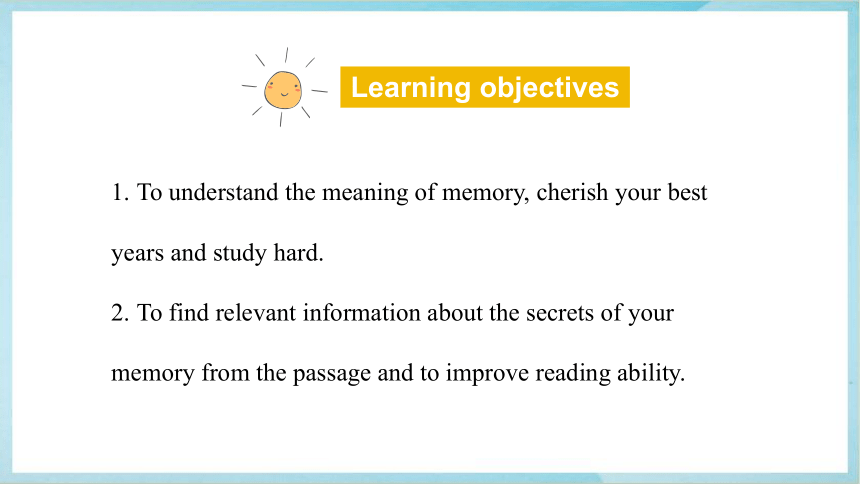

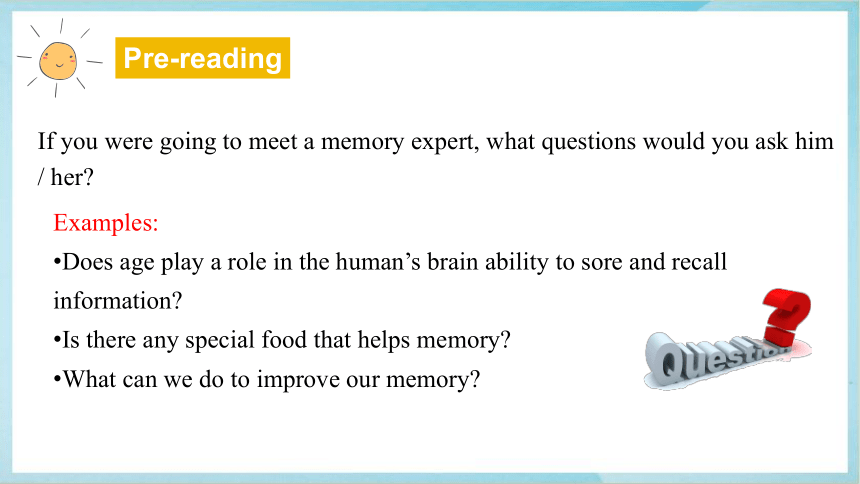
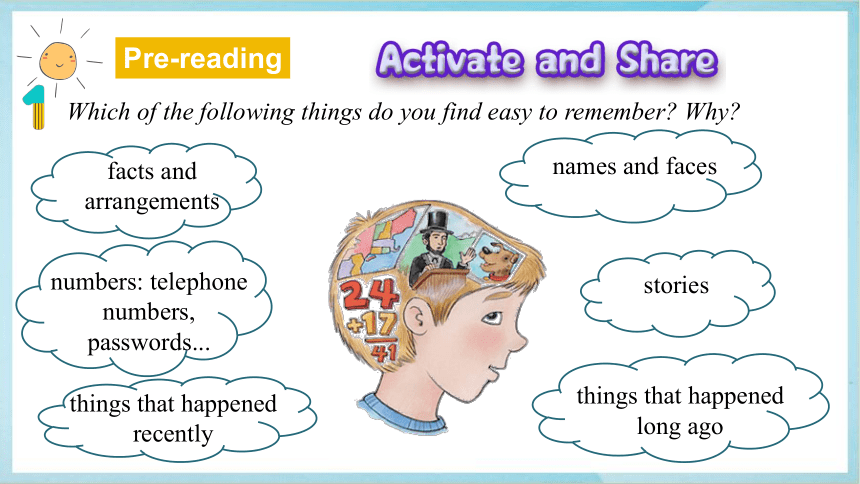
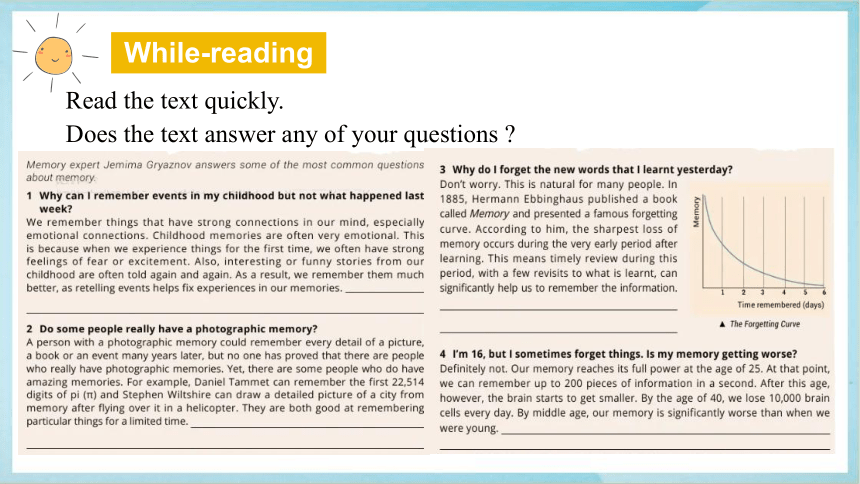

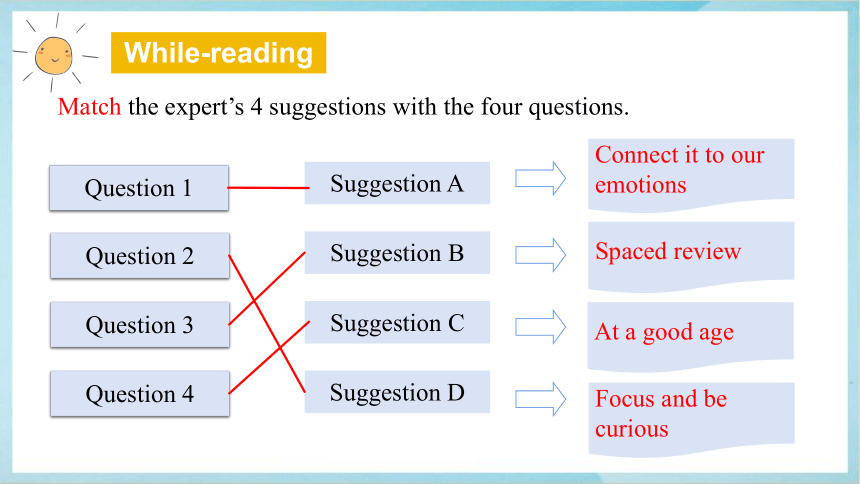
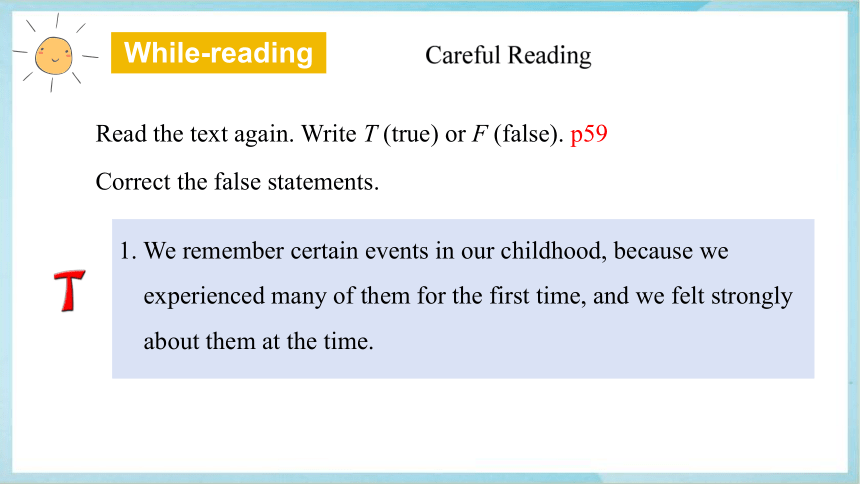
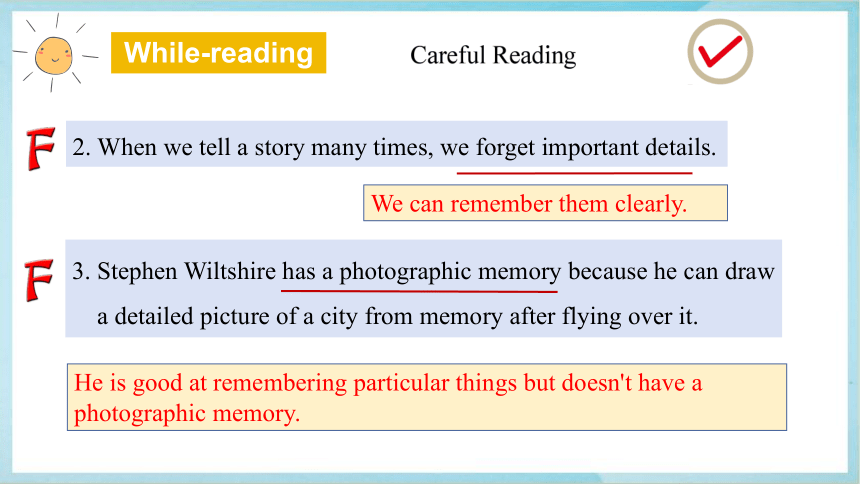

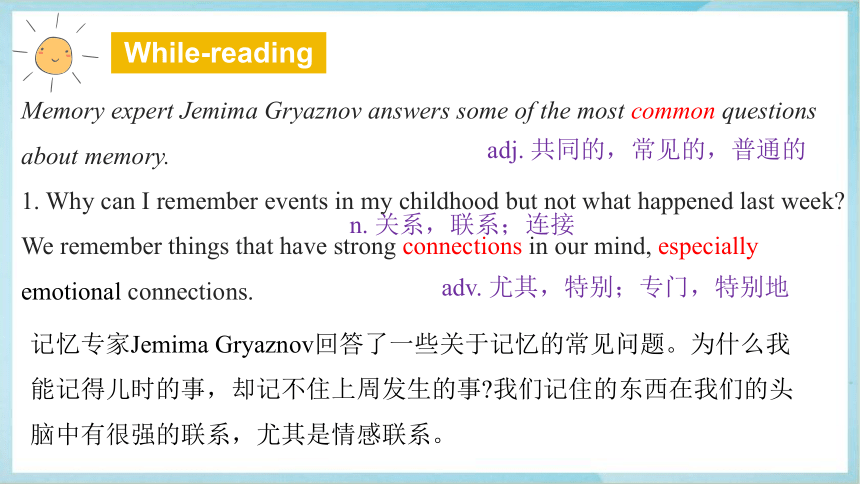
文档简介
(共30张PPT)
Unit 9
Learning
Lesson 3
The Secrets of Your Memory
1. To understand the meaning of memory, cherish your best years and study hard.
2. To find relevant information about the secrets of your memory from the passage and to improve reading ability.
Learning objectives
Lead-in
If you were going to meet a memory expert, what questions would you ask him / her
Examples:
Does age play a role in the human’s brain ability to sore and recall information
Is there any special food that helps memory
What can we do to improve our memory
Pre-reading
Which of the following things do you find easy to remember Why
names and faces
facts and arrangements
stories
things that happened long ago
things that happened recently
numbers: telephone numbers, passwords...
Pre-reading
Read the text quickly.
Does the text answer any of your questions
While-reading
1. Why can I remember events in my childhood but not what happened last week
2. Do some people really have a photographic memory
3. Why do I forget the new words that I learnt yesterday
4. I’m 16, but I sometimes forget things. Is my memory getting worse
Read the text quickly. What questions are answered in the text
Does the text answer any of your questions Share with us!
While-reading
Question 1
Question 2
Question 3
Question 4
Suggestion A
Suggestion B
Suggestion C
Suggestion D
Match the expert’s 4 suggestions with the four questions.
Connect it to our emotions
Spaced review
At a good age
Focus and be curious
While-reading
Read the text again. Write T (true) or F (false). p59
Correct the false statements.
1. We remember certain events in our childhood, because we experienced many of them for the first time, and we felt strongly about them at the time.
Careful Reading
While-reading
2. When we tell a story many times, we forget important details.
We can remember them clearly.
3. Stephen Wiltshire has a photographic memory because he can draw a detailed picture of a city from memory after flying over it.
He is good at remembering particular things but doesn't have a photographic memory.
Careful Reading
While-reading
5. The sharpest loss of memory occurs during the first five days.
during the very early period after learning.
6. Our memory starts to get worse in middle age.
after the age of 25.
4. It has been proved that some people have a photographic memory.
No one has been proved to have a photographic memory.
Careful Reading
Memory expert Jemima Gryaznov answers some of the most common questions about memory.
1. Why can I remember events in my childhood but not what happened last week
We remember things that have strong connections in our mind, especially emotional connections.
adj. 共同的,常见的,普通的
n. 关系,联系;连接
adv. 尤其,特别;专门,特别地
记忆专家Jemima Gryaznov回答了一些关于记忆的常见问题。为什么我能记得儿时的事,却记不住上周发生的事 我们记住的东西在我们的头脑中有很强的联系,尤其是情感联系。
While-reading
Childhood memories are often very emotional. This is because when we experience things for the first time, we often have strong feelings of fear or excitement. Also, interesting or funny stories from our childhood are often told again and again. As a result, we remember them much better, as retelling events helps fix experiences in our memories.
第一次
n. 激动,兴奋
一次又一次
结果
fix sth in one’s memories:牢记某事
A. What can we learn from all this When remembering something new, try to connect it to our emotions. It is important to connect it with what we already know. Also, we can try to retell what we have learnt to a few others.
connect…to/with/and:把…连接起来
v. (以不同的方式)复述,重新讲述
While-reading
Find out the truths and advice that Jemima Gryaznov gives about memory.
Truth
We remember things that have strong connections in our mind, especially emotional connections.
Advice
We need to make strong connections with things we want to remember in our mind, especially emotional connections.
Question 1
While-reading
2. Do some people really have a photographic memory
A person with a photographic memory could remember every detail of a picture, a book or an event many years later, but no one has proved that there are people who really have photographic memories. Yet, there are some people who do have amazing memories. For example, Daniel Tammet can remember the first 22,514 digits of pi (T) and Stephen Wiltshire can draw a detailed picture of a city from memory after flying over it in a helicopter. They are both good at remembering particular things for a limited time.
n. 细节; 详情
v. 证明
adv. 然而; 仍然
的确:用于强调主要动词
最前面的
圆周率
adj. 详尽的,详细的
fly over:…飞越
be good at doing sth. : 擅长做某事
adj. 有限的
D. As most of us do not have amazing memories like them, when memorising detailed learning materials, we simply need to focus on the important ideas and be curious about what we learn. Asking questions about what we learn also helps with memorisation. Another effective technique to remember things is to group similar ideas or information together so that they can be easily connected to things that are already known.
n. 材料,原料;素材
专注于
be curious about: 对…好奇
adj. 有效的;实际的
v. (使)成组,聚集
adj. 相像的,类似的
Find out the truths and advice that Jemima Gryaznov gives about memory.
Question 2
Truth
Nobody has a photographic memory.
Advice
We need to focus on the important ideas and be curious about what we learn when memorising complex learning materials.
3. Why do I forget the new words that I learnt yesterday
Don't worry. This is natural for many people. In1885, Hermann Ebbinghaus published a book called Memory and presented a famous forgetting curve. According to him, the sharpest loss of memory occurs during the very early period after learning. This means timely review during this period, with a few revisits to what is learnt, can significantly help us to remember the information.
C. So take it easy. You are at a good age in terms of your memory. Make good use of it!
v. 出版;发行
v. 展示;引见,介绍
遗忘曲线
According to:根据
n.一段时间,时期
及时复习
review=revisit=go over
adv. 显著地,相当数量地
significant (adj.)
放轻松
in terms of:就…而言
充分利用 = take the advantage of
Find out the truths and advice that Jemima Gryaznov gives about memory.
Question 3
Truth
The sharpest loss of memory occurs during the very early period after learning.
Advice
We need to review the information at regular intervals, especially in the first day after learning it.
B. Therefore, one of the golden rules to increase how much we remember is to review the material periodically, especially during the first day after learning. This “spaced review” soon after learning helps build stronger memories and it is more effective than waiting to review everything before exams.
adv. 因此,所以
黄金法则
adv. 定期地,周期性地
adj. 隔开的;间隔排列的
soon after : 不久之后
因此,提高记忆量的黄金法则之一就是定期复习,尤其是在学习后的第一天。这种学习后的“间隔复习”有助于建立更强的记忆,比等到考试前再复习更有效。
Find out the truths and advice that Jemima Gryaznov gives about memory.
Advice
We need to train our memory to remember more when we’re older.
Truth
Our memory reaches its full power at the age of 25.
Question 4
Jemima Gryaznov thinks people remember things they have strong sentimental attachment.
When we do things with enthusiasm, we tend to remember them well.
When we try to remember detailed materials, we should focus on the important ideas.
Jemima Gryaznov suggested another effective method to remember things: grouping similar ideas or information together.
A good strategy to increase memory is to review the material you are trying to remember often.
emotional
excitement
memorise
technique
periodically
P60-9 Replace the underlined words and phrase with the words from the text.
Practice
Do you believe what I said in the passage Why
Jemima Gryaznov
Post-reading
How has the expert tried to make her statements to each question convincing What methods has she used and what signal words can you find
To make her statements convincing the expert used:
examples: For example…
figures: a famous forgetting curve
quote: According to…
numbers: 25, 200, 40
Think and Share
Imagine and create
2 Are there any answers given by Jemima Gryaznov that are not convincing to you What are your doubts
Underline the most and least convincing words in the text that Jemima Gryazov puts forward.
Discuss what methods she uses to convince others.
Think and Share
Subject–Verb Agreement
Subject–verb agreement simply means the subject and verb must agree in number. This means both need to be singular or both need to be plural.
Examples:
The list of items is on the desk.
Breaking and entering is against the law.
Some of the apples are missing.
facts and arrangements 事实和安排
arrangement用作名词,意为“计划;安排”。
This arrangement suits us perfectly.
这个安排对我们来说太合适了。
【词汇拓展】
arrange vt. 安排;筹备
arrange sth 筹备某物;筹划某事
arrange to do sth 安排好做某事
arrange for sb to do sth 安排某人做某事
arrange for sth 安排某物
They have arranged to meet this weekend.
他们已经安排好这个周末见面。
Circle the subject and then use the correct form of the verbs to complete the sentences.
1. Retelling events _________ (help) fix experiences in our memories.
2. There _________ (be) some people who do have amazing memories.
3. They _________ (be) both good at remembering particular things for a limited time.
4. One of the golden rules to increase how much we remember _________ (be) to review the material periodically.
helps
are
are
is
English is a must in your study, and you need to remember a lot when learning it. How do you remember all the English words and rules Write a short passage about your memorizing.
Homework
Unit 9
Learning
Lesson 3
The Secrets of Your Memory
1. To understand the meaning of memory, cherish your best years and study hard.
2. To find relevant information about the secrets of your memory from the passage and to improve reading ability.
Learning objectives
Lead-in
If you were going to meet a memory expert, what questions would you ask him / her
Examples:
Does age play a role in the human’s brain ability to sore and recall information
Is there any special food that helps memory
What can we do to improve our memory
Pre-reading
Which of the following things do you find easy to remember Why
names and faces
facts and arrangements
stories
things that happened long ago
things that happened recently
numbers: telephone numbers, passwords...
Pre-reading
Read the text quickly.
Does the text answer any of your questions
While-reading
1. Why can I remember events in my childhood but not what happened last week
2. Do some people really have a photographic memory
3. Why do I forget the new words that I learnt yesterday
4. I’m 16, but I sometimes forget things. Is my memory getting worse
Read the text quickly. What questions are answered in the text
Does the text answer any of your questions Share with us!
While-reading
Question 1
Question 2
Question 3
Question 4
Suggestion A
Suggestion B
Suggestion C
Suggestion D
Match the expert’s 4 suggestions with the four questions.
Connect it to our emotions
Spaced review
At a good age
Focus and be curious
While-reading
Read the text again. Write T (true) or F (false). p59
Correct the false statements.
1. We remember certain events in our childhood, because we experienced many of them for the first time, and we felt strongly about them at the time.
Careful Reading
While-reading
2. When we tell a story many times, we forget important details.
We can remember them clearly.
3. Stephen Wiltshire has a photographic memory because he can draw a detailed picture of a city from memory after flying over it.
He is good at remembering particular things but doesn't have a photographic memory.
Careful Reading
While-reading
5. The sharpest loss of memory occurs during the first five days.
during the very early period after learning.
6. Our memory starts to get worse in middle age.
after the age of 25.
4. It has been proved that some people have a photographic memory.
No one has been proved to have a photographic memory.
Careful Reading
Memory expert Jemima Gryaznov answers some of the most common questions about memory.
1. Why can I remember events in my childhood but not what happened last week
We remember things that have strong connections in our mind, especially emotional connections.
adj. 共同的,常见的,普通的
n. 关系,联系;连接
adv. 尤其,特别;专门,特别地
记忆专家Jemima Gryaznov回答了一些关于记忆的常见问题。为什么我能记得儿时的事,却记不住上周发生的事 我们记住的东西在我们的头脑中有很强的联系,尤其是情感联系。
While-reading
Childhood memories are often very emotional. This is because when we experience things for the first time, we often have strong feelings of fear or excitement. Also, interesting or funny stories from our childhood are often told again and again. As a result, we remember them much better, as retelling events helps fix experiences in our memories.
第一次
n. 激动,兴奋
一次又一次
结果
fix sth in one’s memories:牢记某事
A. What can we learn from all this When remembering something new, try to connect it to our emotions. It is important to connect it with what we already know. Also, we can try to retell what we have learnt to a few others.
connect…to/with/and:把…连接起来
v. (以不同的方式)复述,重新讲述
While-reading
Find out the truths and advice that Jemima Gryaznov gives about memory.
Truth
We remember things that have strong connections in our mind, especially emotional connections.
Advice
We need to make strong connections with things we want to remember in our mind, especially emotional connections.
Question 1
While-reading
2. Do some people really have a photographic memory
A person with a photographic memory could remember every detail of a picture, a book or an event many years later, but no one has proved that there are people who really have photographic memories. Yet, there are some people who do have amazing memories. For example, Daniel Tammet can remember the first 22,514 digits of pi (T) and Stephen Wiltshire can draw a detailed picture of a city from memory after flying over it in a helicopter. They are both good at remembering particular things for a limited time.
n. 细节; 详情
v. 证明
adv. 然而; 仍然
的确:用于强调主要动词
最前面的
圆周率
adj. 详尽的,详细的
fly over:…飞越
be good at doing sth. : 擅长做某事
adj. 有限的
D. As most of us do not have amazing memories like them, when memorising detailed learning materials, we simply need to focus on the important ideas and be curious about what we learn. Asking questions about what we learn also helps with memorisation. Another effective technique to remember things is to group similar ideas or information together so that they can be easily connected to things that are already known.
n. 材料,原料;素材
专注于
be curious about: 对…好奇
adj. 有效的;实际的
v. (使)成组,聚集
adj. 相像的,类似的
Find out the truths and advice that Jemima Gryaznov gives about memory.
Question 2
Truth
Nobody has a photographic memory.
Advice
We need to focus on the important ideas and be curious about what we learn when memorising complex learning materials.
3. Why do I forget the new words that I learnt yesterday
Don't worry. This is natural for many people. In1885, Hermann Ebbinghaus published a book called Memory and presented a famous forgetting curve. According to him, the sharpest loss of memory occurs during the very early period after learning. This means timely review during this period, with a few revisits to what is learnt, can significantly help us to remember the information.
C. So take it easy. You are at a good age in terms of your memory. Make good use of it!
v. 出版;发行
v. 展示;引见,介绍
遗忘曲线
According to:根据
n.一段时间,时期
及时复习
review=revisit=go over
adv. 显著地,相当数量地
significant (adj.)
放轻松
in terms of:就…而言
充分利用 = take the advantage of
Find out the truths and advice that Jemima Gryaznov gives about memory.
Question 3
Truth
The sharpest loss of memory occurs during the very early period after learning.
Advice
We need to review the information at regular intervals, especially in the first day after learning it.
B. Therefore, one of the golden rules to increase how much we remember is to review the material periodically, especially during the first day after learning. This “spaced review” soon after learning helps build stronger memories and it is more effective than waiting to review everything before exams.
adv. 因此,所以
黄金法则
adv. 定期地,周期性地
adj. 隔开的;间隔排列的
soon after : 不久之后
因此,提高记忆量的黄金法则之一就是定期复习,尤其是在学习后的第一天。这种学习后的“间隔复习”有助于建立更强的记忆,比等到考试前再复习更有效。
Find out the truths and advice that Jemima Gryaznov gives about memory.
Advice
We need to train our memory to remember more when we’re older.
Truth
Our memory reaches its full power at the age of 25.
Question 4
Jemima Gryaznov thinks people remember things they have strong sentimental attachment.
When we do things with enthusiasm, we tend to remember them well.
When we try to remember detailed materials, we should focus on the important ideas.
Jemima Gryaznov suggested another effective method to remember things: grouping similar ideas or information together.
A good strategy to increase memory is to review the material you are trying to remember often.
emotional
excitement
memorise
technique
periodically
P60-9 Replace the underlined words and phrase with the words from the text.
Practice
Do you believe what I said in the passage Why
Jemima Gryaznov
Post-reading
How has the expert tried to make her statements to each question convincing What methods has she used and what signal words can you find
To make her statements convincing the expert used:
examples: For example…
figures: a famous forgetting curve
quote: According to…
numbers: 25, 200, 40
Think and Share
Imagine and create
2 Are there any answers given by Jemima Gryaznov that are not convincing to you What are your doubts
Underline the most and least convincing words in the text that Jemima Gryazov puts forward.
Discuss what methods she uses to convince others.
Think and Share
Subject–Verb Agreement
Subject–verb agreement simply means the subject and verb must agree in number. This means both need to be singular or both need to be plural.
Examples:
The list of items is on the desk.
Breaking and entering is against the law.
Some of the apples are missing.
facts and arrangements 事实和安排
arrangement用作名词,意为“计划;安排”。
This arrangement suits us perfectly.
这个安排对我们来说太合适了。
【词汇拓展】
arrange vt. 安排;筹备
arrange sth 筹备某物;筹划某事
arrange to do sth 安排好做某事
arrange for sb to do sth 安排某人做某事
arrange for sth 安排某物
They have arranged to meet this weekend.
他们已经安排好这个周末见面。
Circle the subject and then use the correct form of the verbs to complete the sentences.
1. Retelling events _________ (help) fix experiences in our memories.
2. There _________ (be) some people who do have amazing memories.
3. They _________ (be) both good at remembering particular things for a limited time.
4. One of the golden rules to increase how much we remember _________ (be) to review the material periodically.
helps
are
are
is
English is a must in your study, and you need to remember a lot when learning it. How do you remember all the English words and rules Write a short passage about your memorizing.
Homework
同课章节目录
- Unit 7 Art
- Lesson 1 Masterpieces
- Lesson 2 Beijing Opera
- Lesson 3 A Musical Genius
- Unit 8 Green living
- Lesson 1 Roots and Shoots
- Lesson 2 Greening the Desert
- Lesson 3 "White Bikes" on the Road
- Unit 9 Learning
- Lesson 1 Active Learning
- Lesson 2 Language Learning Tips
- Lesson 3 The Secrets of Your Memory
